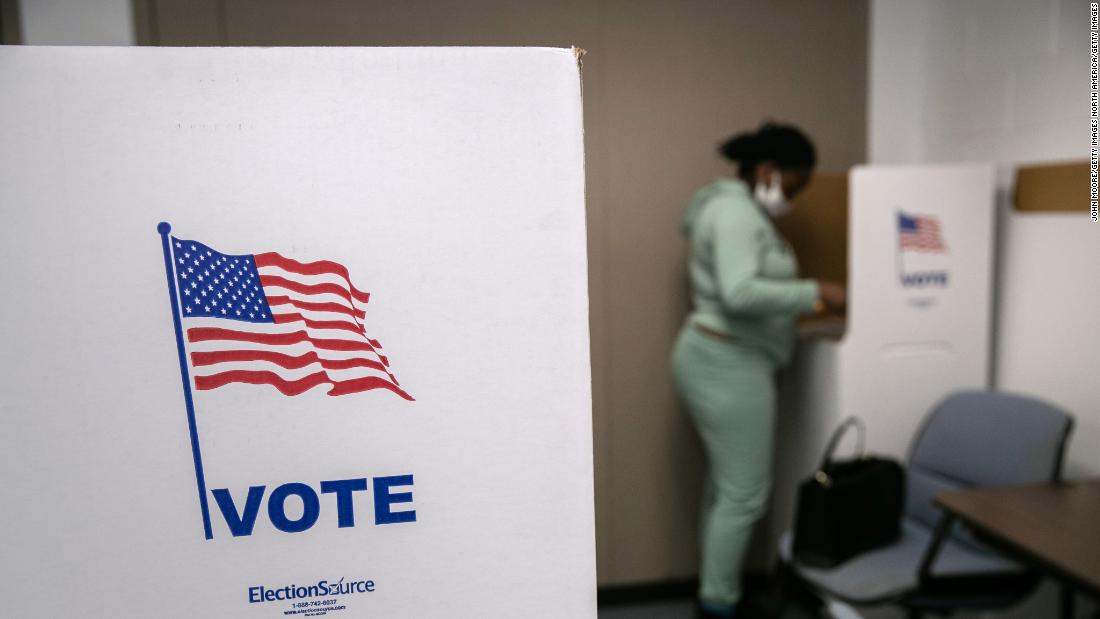Pro-Trump Republicans try to rewrite state election laws as a voting rights showdown looms in Congress
In Wisconsin, some GOP lawmakers are trying to sideline a bipartisan commission that oversees elections in the state.
And Republican legislators from Arizona to Florida are planning to take up new voting restrictions in upcoming legislative sessions.
As a likely showdown looms in Congress this week over federal voting legislation, Republicans aligned with the former President are pressing ahead at the state level to change voting procedures, conduct partisan investigations of the last presidential contest and seize more control over the machinery of elections.
Democrats and voting rights advocates warn that the unrelenting campaign to cast doubt on the legitimacy of President Joe Biden’s 2020 victory over Trump could erode voter confidence in elections and increase the chances that losing candidates and their supporters will challenge the results of free and fair elections in the future.
“Every day that goes by, I am more and more concerned about the direction and resilience of American democracy,” said David Becker, executive director of the nonpartisan Center for Election Innovation & Research. “I’m worried that we are heading down a path where there are those who cannot accept that … their candidate could lose.”
Recent polling underscores the peril.
The Post-UMD poll also exposed a stark partisan divide: 40% of Republicans and 41% of Independents said violence against the government could be justified versus 23% of Democrats.
‘Slow-moving insurrection’
Brennan’s analysis found 88 restrictive bills introduced last year will carry over into upcoming legislative sessions, and that 13 new bills had been pre-filed as of last month.
The new proposals include a measure that would ban the use of drop boxes in Georgia — where Biden became the first Democratic presidential candidate to win the state in 28 years. An Arizona lawmaker wants to establish stricter voter ID requirements.
In Florida, a state Trump won handily, Republican Gov. Ron DeSantis is pushing a new package of voting measures that includes increasing penalties for collecting voters’ ballots and establishing a new office to investigate and prosecute election fraud.
Meanwhile, in Michigan, where Democratic Gov. Gretchen Whitmer vetoed several GOP-sponsored election bills last year, Republican activists are collecting signatures to attempt an end-run around the governor.
The initiative would establish new voter ID requirements, along with barring election officials from sending absentee ballot applications to all voters. The state, which Biden won by about 154,000 votes, saw record turnout in the last presidential election, with some 3.2 million voters casting absentee ballots.
Under a quirk in the state constitution, if the Secure MI Vote organizers gather at least 340,047 valid signatures in support of their initiative, the GOP-controlled House and Senate can enact the changes without Whitmer having the power to veto it.
Jamie Roe, a spokesman for the group, said volunteers are “on the path” to reaching their goal but declined to say how many signatures they have collected.
If successful, the audit initiative would establish a grand jury with power to subpoena evidence and issue arrest warrants for those “impeding or otherwise stalling” the audit’s progress.
Mark Brewer, a former Michigan Democratic Party chairman who practices election and campaign finance law, said the activity by Trump loyalists feels like “a slow-moving insurrection that I think is laying the groundwork to undermine elections in 2022 and 2024.”
Wisconsin showdown
In Wisconsin, a swing state where the last two presidential elections have been decided by narrow margins, the battles over election administration have grown more heated.
Ann Jacobs, a Democratic lawyer from Milwaukee who serves as the elections commission’s chairwoman, said Gableman’s team recently delivered an “insanely broad” subpoena to an IT employee at the agency. It demanded “any and all communications” about the 2020 election between the employee and any other person since January 1, 2020, she said.
Gableman previously asked a judge to arrest two mayors after failed attempts to compel the officials to testify behind closed doors and provide documents. Court cases related to Gableman’s subpoenas are pending.
Gableman’s office did not respond to CNN interview requests. Vos spokeswoman Angela Joyce said in an email Friday that the Speaker has asked Gableman for recommendations by February that could help shape new laws this year during the legislative session.
A new proposal circulating among legislators from GOP state Rep. Timothy Ramthun would dissolve the commission and transfer its duties to the secretary of state. He did not respond to interview requests from CNN.
US Sen. Ron Johnson, a Republican, has gone further, suggesting that the GOP-controlled state legislature seize oversight of federal elections in the state, bypassing the elections commission. The idea has received a cool reception from state legislative leaders so far.
Johnson, however, has not backed down, citing a portion of the US Constitution that gives state legislatures the authority to establish the “times, places and manner” of federal elections. “It’s time for the state legislature to reclaim its constitutional authority over federal elections and make sure that our election clerks follow the law,” he said, in part, in a statement to CNN.
Jacobs, the commission’s chairwoman, said the rhetoric about elections in Wisconsin has moved into a “much more insidious and much more dangerous” direction than ever before.
“This cannot be what’s accepted as normal,” she said.
CNN’s Devan Cole contributed to this story.
![]()


